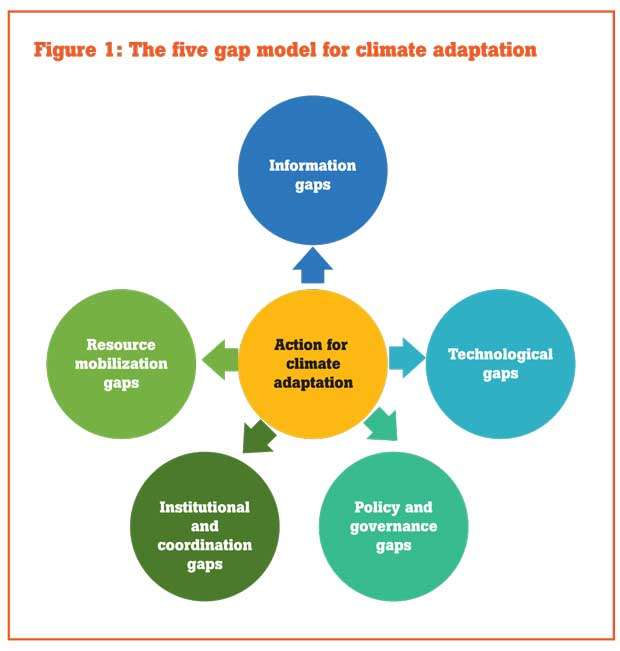Reply To:
Name - Reply Comment
Last Updated : 2024-04-25 00:00:00
 Sri Lanka ranked in the fourth place among countries most affected by extreme weather events in 2016, according to the Global Climate Risk Index (CRI). The average CRI for Sri Lanka for the last 20 years (1997-2017) was recorded as 48.
Sri Lanka ranked in the fourth place among countries most affected by extreme weather events in 2016, according to the Global Climate Risk Index (CRI). The average CRI for Sri Lanka for the last 20 years (1997-2017) was recorded as 48.
While the CRI fluctuates, depending on the disaster impacts on annual basis, the 2016 rank clearly indicatesthat Sri Lanka’s vulnerability to natural disasters has increased dramatically. This suggests the need to take appropriate policy measures in a timely manner to combat the negative impacts of such calamities.

IPS’ policy engagement
Evidence-basedresearch is the basis for formulating effective climate policies. Research is vital to improve knowledge on climate change and to design suitable interventions. Sound research is particularly important to address policy level issues in facing the challenges of climate change. This is at the heart of the environment policy research programme of the Institute of Policy Studies of Sri Lanka (IPS). In 2009, the IPS came up with a framework for a national agenda to mainstreaming climate change for sustainable development in the country. The report served as the platform for climate change research at IPS, which later evolved into a comprehensive research programme.
Over the years, IPS has made significant contributions towardslinking research with practicalpolicy formulation. The National Adaptation Plan for Climate Change Impacts in Sri Lanka 2016 – 2025 (NAP) was prepared by a team of researchers from IPS, for the Ministry of Mahaweli Development and Environment. As the NAP highlights, Sri Lanka needs to concentrate on five gaps in adapting to the impacts of climate change – thus advocating for a Five-Gap Model for climate adaptation in Sri Lanka. These gaps include information gaps, technological gaps, policy and governance gaps, institutional and coordination gaps, and resource mobilization gaps. This model isalso applicable to many other developing countries which face similar issues.
In an effort to further enhance its role in climate policy research, IPS conducted a policy engagement forum in May 2018. The deliberations at the forum reiterated that timely, comprehensive, and evidence-based research is a key pillar in mitigating the impacts of climate change. The event was attended by climate experts representing the government, the non-government, and the private sectors.
The first session of the forum focused on sharing key inputs from IPS research on climate change with the stakeholders.
Several important issues, ranging from the impacts of climate change to policy interventions in areas such as agriculture, health, water and irrigation, and infrastructure, were discussed. The lack of evidence-based research was highlighted as a major obstacle to effective policymaking. This lesson-sharing discussion was followed by a dialogue on potential areas for future research.
Key issues in climate adaptation
Based on the participants’ insights, a comprehensive cause and effect diagram (fishbone diagram)was developed to explore options for climate adaptation in Sri Lanka. Information gaps, communication gaps, poor policy environment and institutional problems, poor access to reliable options for adaptation, inadequate risk management options, and increased exposure to climate related risks emerged as the main areas which neededurgent attention when adapting to climate change.
The need for accurate climate information was also highlighted during the discussions. In this regard, the IPS has undertaken an action research programme to bridge the climate information gaps among farmers. A pilot project is being carried out in selected study sites in six districts - Anuradhapura, Badulla, Batticaloa, Hambantota, Kurunegala and Ratnapura - representing all agro-ecological zones in the country.
The IPS has collaborated with the Department of Meteorology, Janathakshan, and the South Asian Network for Development and Environmental Economics (SANDEE) to conduct the study.The potential for climate insurance in Sri Lanka was also explored as a part of the IPS research. A study conducted with the support of Global Development Network (GDN) showed that it is technically feasible to implement index-based insurance in Sri Lanka and identified the challenges that need to be addressed.
The deliberations during the forum also pointed to the need fora dynamic platform to share climate information and data.While, research-based inputs are being generated by research institutes, universities, and government agencies, such information is not effectively shared among those who make use of the information. Besides, climate vulnerability assessments and raw data are available in a scattered manner. Therefore, a centralized information sharing system is vital, especially sinceSri Lankais nowtaking necessary actions to combat climate change.
IPS research, looking into loss and damage assessments due to climate change impacts,has also suggested that the country should have an effective data sharing mechanism for climate disasters. This should be given importance when designing a climate information management system in the future.
Future directions
The outputs from the group work completed by stakeholders also emphasised the need for better coordination, both horizontally and vertically, across different levels.
As the IPS highlighted in its first publication, mainstreaming climate change into Sri Lanka’s development agenda is a prerequisite to implement adaptation policies at all levels.
It is necessary to understand the barriers that hinder coordination among key figures when trying to implement policies.
In addition to climate information and climate insurance, IPS research has also covered severalimportant areas, such asclimate impacts on agriculture, urban climateissues, and disaster risk reduction, and continues to provide more inputs to be fed into climate related policy formulation in Sri Lanka.
(Kanchana Wickramasinghe is a Research Economist and Athula Senaratne is a Research Fellow at the Institute of Policy Studies of Sri Lanka (IPS). To talk to the author, email kanchana@ips.lk / athula@ips.lk. To view this article online and to share your comments, visit the IPS Blog ‘Talking Economics’ - http://www.ips.lk/talkingeconomics/)

Add comment
Comments will be edited (grammar, spelling and slang) and authorized at the discretion of Daily Mirror online. The website also has the right not to publish selected comments.
Reply To:
Name - Reply Comment
US authorities are currently reviewing the manifest of every cargo aboard MV
On March 26, a couple arriving from Thailand was arrested with 88 live animal
According to villagers from Naula-Moragolla out of 105 families 80 can afford
Is the situation in Sri Lanka so grim that locals harbour hope that they coul